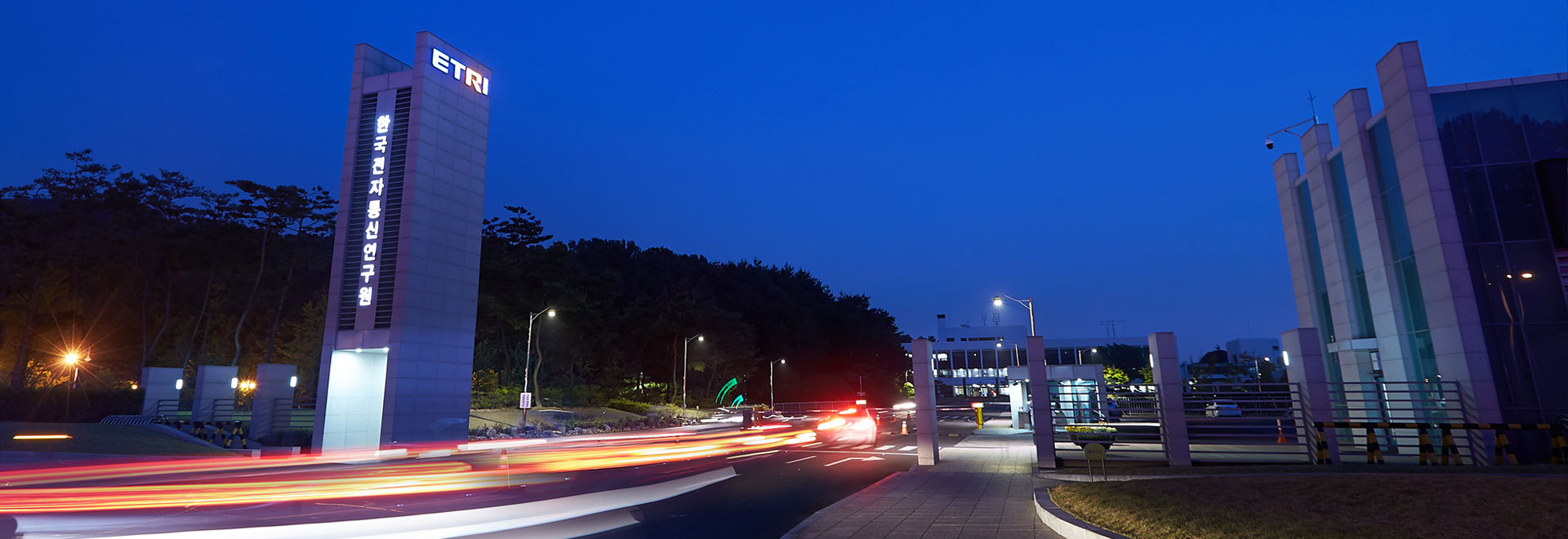
NEWS 1
VR Vocational Training for the Disabled,
applied to over 30 sites in Korea
- 14 barista and steam car wash trainees are employed, continuously seeking expansion in the number of vocational training contents and trainees.
- VR evolves beyond entertainment to technology helping human beings
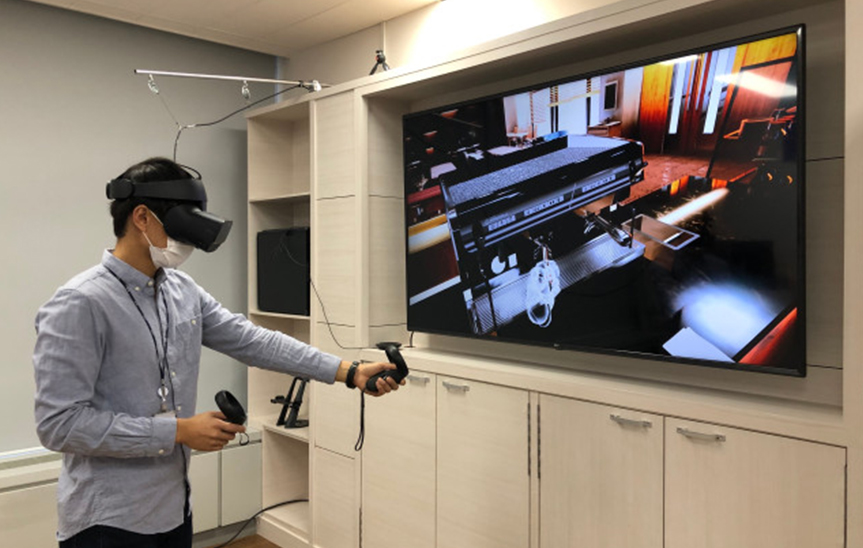
ETRI announced that it has developed personalized virtual training immersive content technology and is applying it to virtual reality (VR) vocational training for the developmentally disabled, centered on special schools and public institutions in Korea.
The ETRI research team developed and utilized contents for virtual vocational training related to barista and steam car wash jobs that are easy for people with developmental disabilities to be employed and develop careers. In the case of the barista content, it provides haptic feedback with vibration on the controller while making coffee which makes the training easy and realistic. The teachers can also help trainees with a simple remote control operation in the virtual environment. In the case of steam car wash content, it provides voice guidance in real time by analyzing the process and performance of the training using the pressure sensor and digitizes the training results when the training is completed.
Currently, VR contents are installed and being used for vocational training and job experience at 30 sites, including three training centers for the developmentally disabled in southern Seoul, Daejeon, and Chungnam in South Korea and 27 special schools across the country. Daejeon Training Center for the Developmental Disabilities actively utilizes VR vocational training contents to lead the trainees to actual employment. Since last year, a total of 17 trainees went through the training session with the VR technology applied, including 11 barista trainees and 6 steam car wash trainees. Among them, 14 trainees succeeded in getting a job.
ETRI is promoting technological advancement by developing ▲multi-user recognition technology for collaborative interaction, ▲personalized virtual intervention automatic control technology, and is committed to actively developing ultra-realistic virtual education·training simulation technology for contents that can be widely used for remote education·training in general.
Youn-Hee Gil, Director
Intelligent Knowledge Content Research Section
(+82-42-860-1031, yhgil@etri.re.kr)
NEWS 2
Development of Anode Binder for All-Solid-State Secondary Battery
- New anode structure using cellulose, a successful localization of eco-friendly core material
- 30% decrease in charge and discharge overpotential and 40% increase in high-rate performance
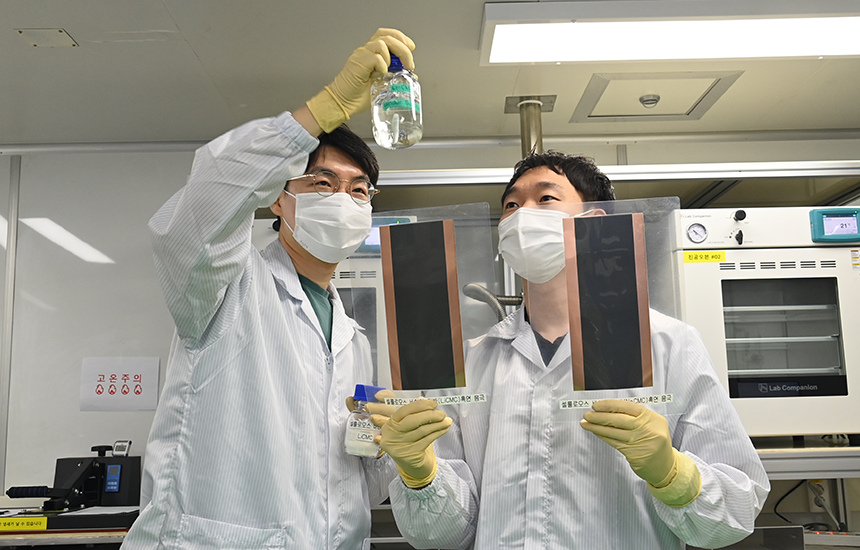
ETRI succeeded in developing a conductive binder (an ionic conductive polymer material that enables a facile movement of mobile ions in the electrode) for an all-solid-state secondary battery, known as a next-generation lithium secondary battery.
The ETRI research team has developed a new conductive binder based on an eco-friendly material called cellulose (a natural macromolecular organic substance which is a type of saccharide that makes up the cell wall components of higher plants) for the anode of an all-solid-state secondary battery. Compared to the existing non-conductive binder, the charge and discharge overpotential was reduced by about 30%, while the high-rate performance was improved by about 40%.
An all-solid-state secondary battery, spotlighted as a next-generation secondary battery, is a battery system with improved safety and energy density achieved by changing the electrolyte for ion transfer within the battery from a liquid to a solid. In a battery, the anode acts as lithium-ion storage for those migrated from the cathode. The anode material is an important factor in determining the charging speed, lifespan, and stability of a battery. The conductive binder developed by the ETRI research team is a kind of anode material.
Although a binder does not take a significant part in the composition of electrodes, it enhances the performance of an all-solid-state battery by covering active materials and providing sufficient adhesion to facilitate charge transfer. However, in order to increase energy transfer efficiency and performance, it is required to use an ionic conductive binder that lowers the interfacial resistance between particles of the active material.
The ETRI research team used commercially available cellulosic material and developed a high-quality ionic conductive binder through an acidification process optimized for mass production.
As ETRI researchers provided a clue to solve the chronic problems of safety and stability of secondary batteries, progress in research on the utility of secondary batteries in electric vehicles, robots, and energy storage systems (ESS) is expected to be accelerated steadily.
Young-Gi Lee, Principal Researcher
Intelligent Sensors Research Section
(+82-42-860-6822, lyg@etri.re.kr)
NEWS 3
ETRI, Leads International Standardization
in Artificial Intelligence
- Dr. Kangchan Lee, appointed as chair of ITU-T JCA-ML
- Plans to present a blueprint for international standardization in artificial intelligence by 2024
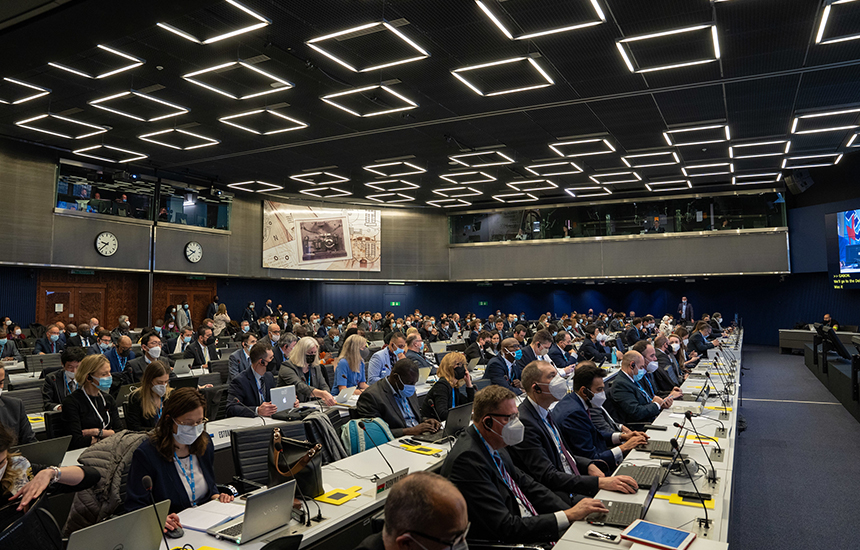
Dr. Kangchan Lee, director of the Intelligence & Information Standards Research Section of ETRI, was appointed as the first chair of the 「Joint Coordination Activity onMachine Learning(JCA-ML)」 during the general meeting of ‘Study Group 13: Future networks, with focus on IMT-2020, cloud computing and trusted network infrastructures’ (SG13) of the ‘International Telecommunication Union Telecommunication Standardization Sector (ITU-T)’, which was held last month.
Joint Coordination Activities (JCA) aims to coordinate standardization work being developed by study groups under ITU-T and other standardization organizations. As the demand for developing standards in artificial intelligence (AI) has been growing recently, the ITU established JCA-ML to prevent fragmentation of standards in AI, especially machine learning, and to coordinate standardization activities among ITU-T study groups.
JCA-ML aims to develop the 'Machine Learning Standardization Roadmap' by 2024, which will be the blueprint for standardization in AI by cooperating with external standardization organizations, consortiums, forums, and academia, as well as ITU-T study groups. Furthermore, it will enable the study groups to promote development, referring to the roadmap presented.
Since 2018, ETRI has developed various AI standards, such as ▲ AI standardization roadmap and cloud machine learning service (Y.3531, Editor: Sungpil Shin, Senior Researcher), ▲ Data quality for analysis and machine learning (ISO/IEC 5259-1, Project Leader: Soowook Ha, Principal Researcher), ▲AI system testing (ISO/IEC TS 29119-11, Project Leader: Jonghong Jeon, Principal Researcher).
As Kangchan Lee was appointed as the chair of JCA-ML, it is expected that ETRI can contribute to reflecting Korean technology on the process of international AI standardization in AI and take a leading role in establishing international standards.
Kangchan Lee, Director
Intelligence & Information Standards Research Section
(+82-42-860-6659, chan@etri.re.kr)
NEWS 4
Promotion of artificial intelligence disaster psychological recovery support platform development
- Help recover from post-traumatic stress disorder following disasters,
and support victims’ return to daily life
- Precise diagnosis·tracking·service using disaster psychological evaluation AI model
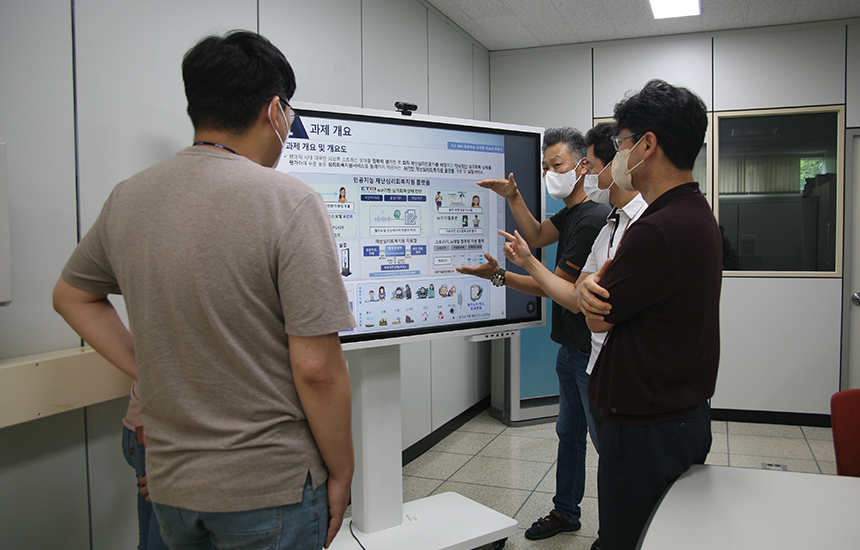
ETRI is promoting the development of an AI-based disaster psychological recovery support platform that can remotely provide high-quality ‘disaster psychological recovery support’ for people suffering from post-traumatic stress disorder following disasters.
ETRI researchers are developing an AI model that can evaluate people's disaster psychology based on the Kor-BERT language model owned by ETRI. The AI model is expected to enable anyone to easily and accurately identify their own psychological state, removing the dependence on the existing counselors. In addition, the research team decided to develop a multimodal-based AI model that analyzes video and audio along with natural language process in order to improve the accuracy of the disaster psychological evaluation AI model.
Also, in order to improve the performance of the AI model, the data will be collected using Digital-Human instead of the existing questionnaire method, which is capable of emotional expression so that people can access it easily and feel friendly. The researchers believe that the evaluation of psychological state and response to the situation will be improved by applying the AI-based monitoring.
In addition to the technology development, The ETRI research team plans to support self-help groups in virtual space as well, in connection with the commercial metaverse platforms for the effective psychological recovery of disaster victims. In the future, the research team also plans to improve the completeness of the AI-based disaster psychological recovery support platform by offering psychological coaching sessions and operating counseling booths in cooperation with Gwangju Metropolitan City.
Kwon-Seob Lim, Director
Honam Research Center, AI Convergence Research Section
(+82-62-970-6611, kaide.lim@etri.re.kr)